BUS201: Business in Society - Global Issues and Business Impact
VerifiedAdded on 2022/12/28
|15
|3904
|53
Essay
AI Summary
This essay critically examines the question of whether a single business can make a substantial difference in addressing global problems. The author argues that businesses have a social responsibility to comply with ethical and corporate governance principles, and they can leverage disruptive technologies and alternative business approaches to address global challenges. The essay uses examples such as Tesla and McDonalds to illustrate how businesses can positively or negatively impact issues like climate change, animal rights, and obesity. It also discusses the role of corporate social responsibility (CSR) and the triple bottom line (TBL) in guiding business actions. Counterarguments are also presented, acknowledging that some global issues require collaborative efforts. The essay concludes by emphasizing the potential for businesses to contribute to solutions while also acknowledging the limitations of a single entity's impact.
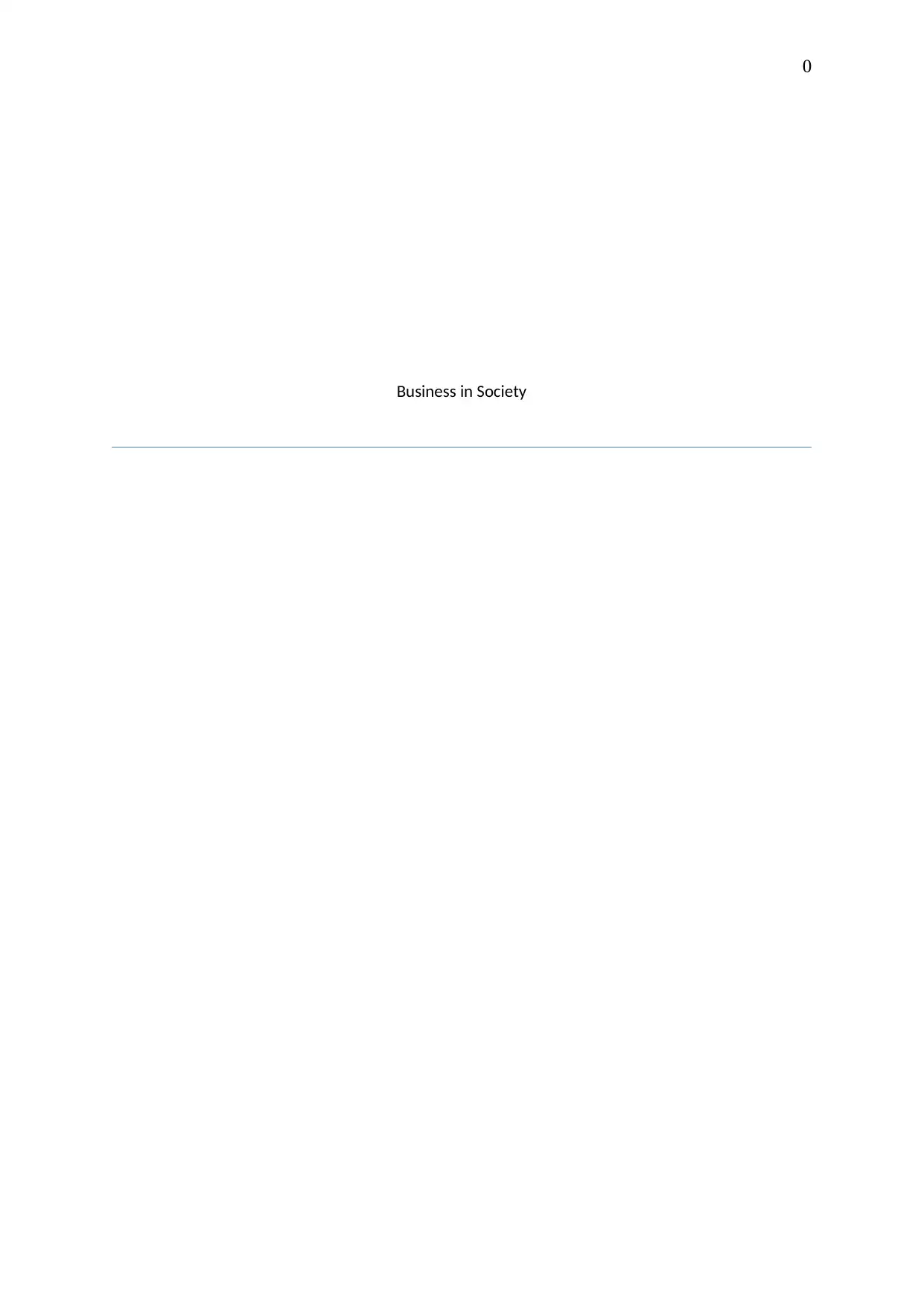
0
Business in Society
Business in Society
Paraphrase This Document
Need a fresh take? Get an instant paraphrase of this document with our AI Paraphraser
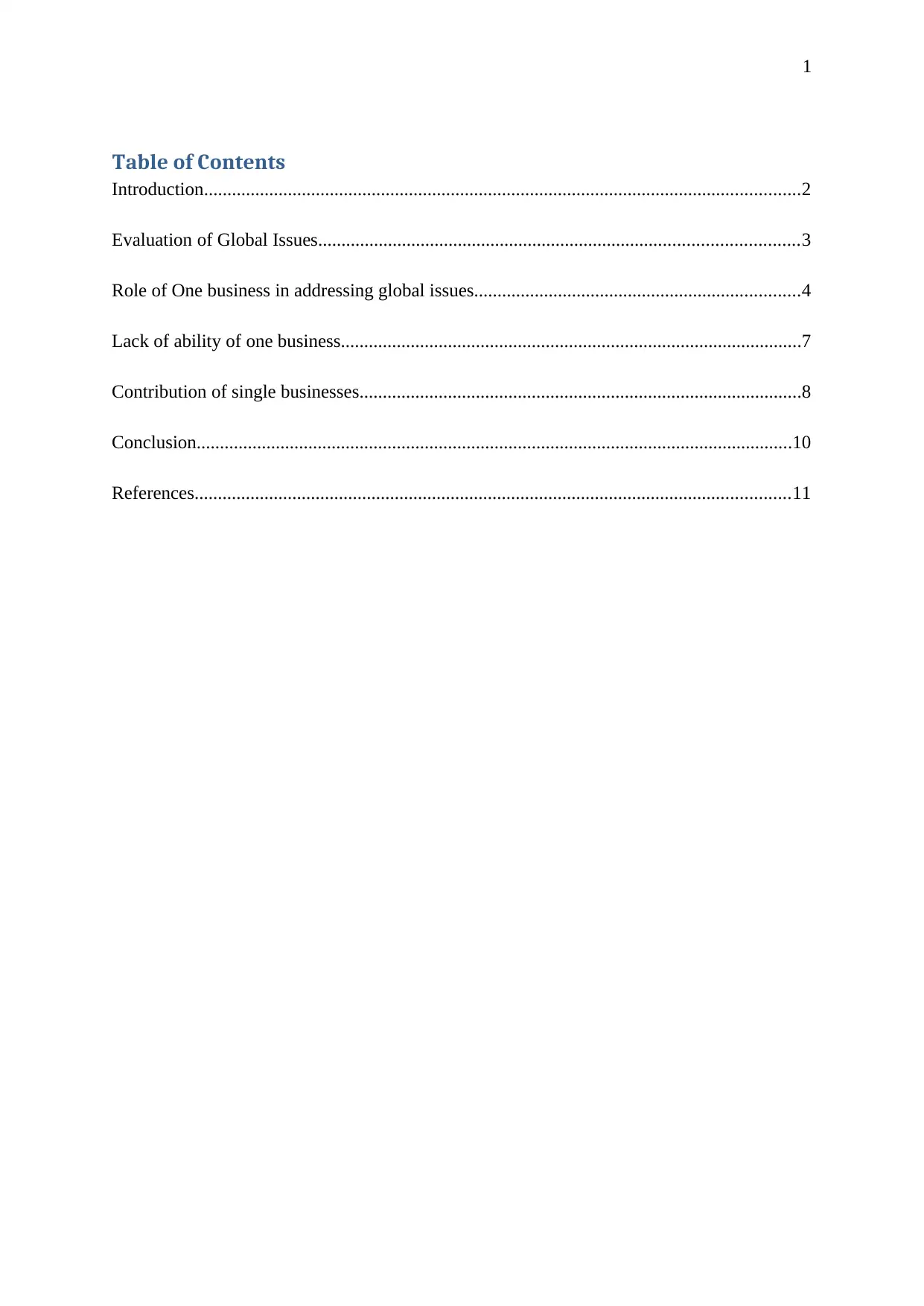
1
Table of Contents
Introduction................................................................................................................................2
Evaluation of Global Issues.......................................................................................................3
Role of One business in addressing global issues......................................................................4
Lack of ability of one business...................................................................................................7
Contribution of single businesses...............................................................................................8
Conclusion................................................................................................................................10
References................................................................................................................................11
Table of Contents
Introduction................................................................................................................................2
Evaluation of Global Issues.......................................................................................................3
Role of One business in addressing global issues......................................................................4
Lack of ability of one business...................................................................................................7
Contribution of single businesses...............................................................................................8
Conclusion................................................................................................................................10
References................................................................................................................................11
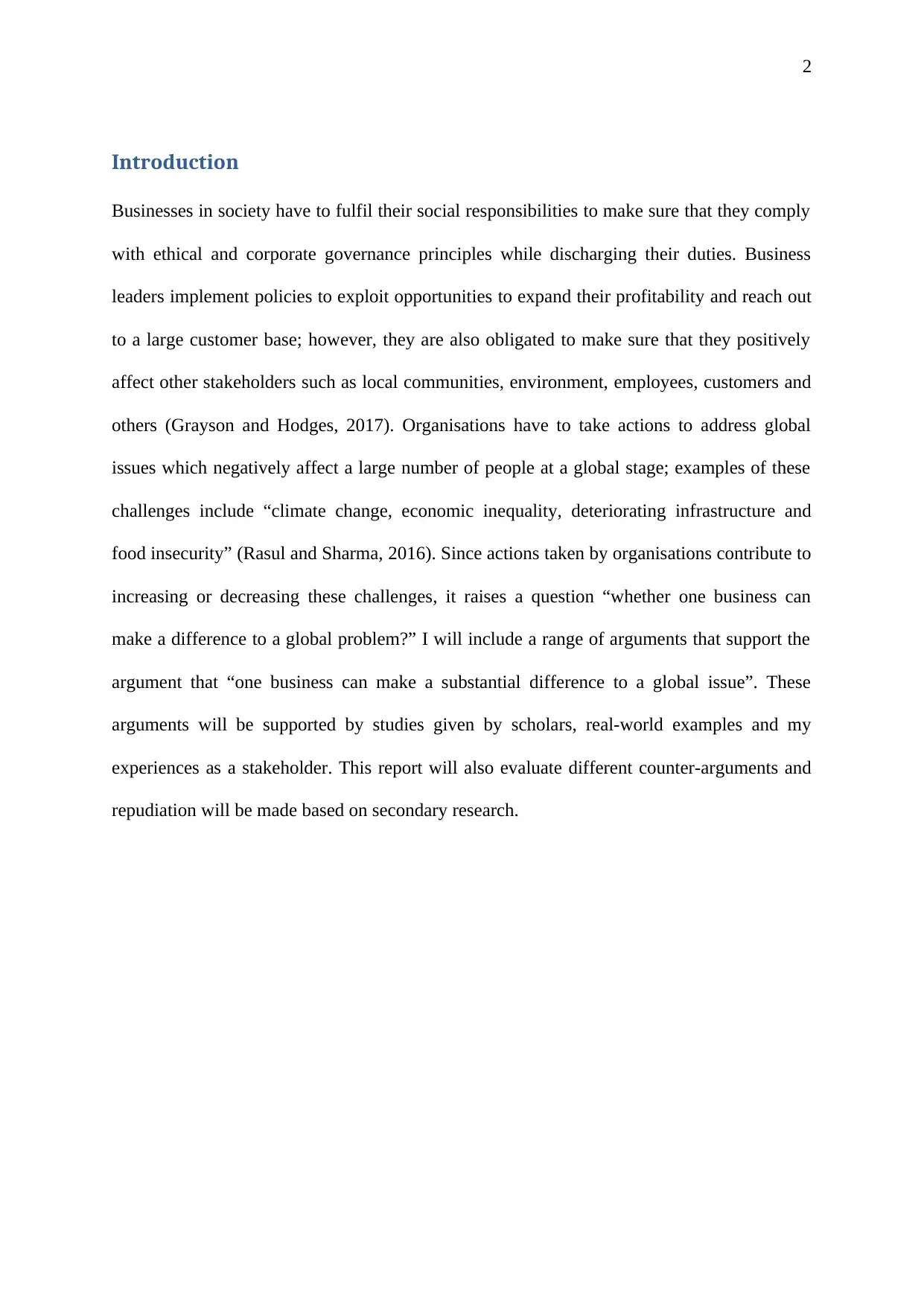
2
Introduction
Businesses in society have to fulfil their social responsibilities to make sure that they comply
with ethical and corporate governance principles while discharging their duties. Business
leaders implement policies to exploit opportunities to expand their profitability and reach out
to a large customer base; however, they are also obligated to make sure that they positively
affect other stakeholders such as local communities, environment, employees, customers and
others (Grayson and Hodges, 2017). Organisations have to take actions to address global
issues which negatively affect a large number of people at a global stage; examples of these
challenges include “climate change, economic inequality, deteriorating infrastructure and
food insecurity” (Rasul and Sharma, 2016). Since actions taken by organisations contribute to
increasing or decreasing these challenges, it raises a question “whether one business can
make a difference to a global problem?” I will include a range of arguments that support the
argument that “one business can make a substantial difference to a global issue”. These
arguments will be supported by studies given by scholars, real-world examples and my
experiences as a stakeholder. This report will also evaluate different counter-arguments and
repudiation will be made based on secondary research.
Introduction
Businesses in society have to fulfil their social responsibilities to make sure that they comply
with ethical and corporate governance principles while discharging their duties. Business
leaders implement policies to exploit opportunities to expand their profitability and reach out
to a large customer base; however, they are also obligated to make sure that they positively
affect other stakeholders such as local communities, environment, employees, customers and
others (Grayson and Hodges, 2017). Organisations have to take actions to address global
issues which negatively affect a large number of people at a global stage; examples of these
challenges include “climate change, economic inequality, deteriorating infrastructure and
food insecurity” (Rasul and Sharma, 2016). Since actions taken by organisations contribute to
increasing or decreasing these challenges, it raises a question “whether one business can
make a difference to a global problem?” I will include a range of arguments that support the
argument that “one business can make a substantial difference to a global issue”. These
arguments will be supported by studies given by scholars, real-world examples and my
experiences as a stakeholder. This report will also evaluate different counter-arguments and
repudiation will be made based on secondary research.
⊘ This is a preview!⊘
Do you want full access?
Subscribe today to unlock all pages.

Trusted by 1+ million students worldwide
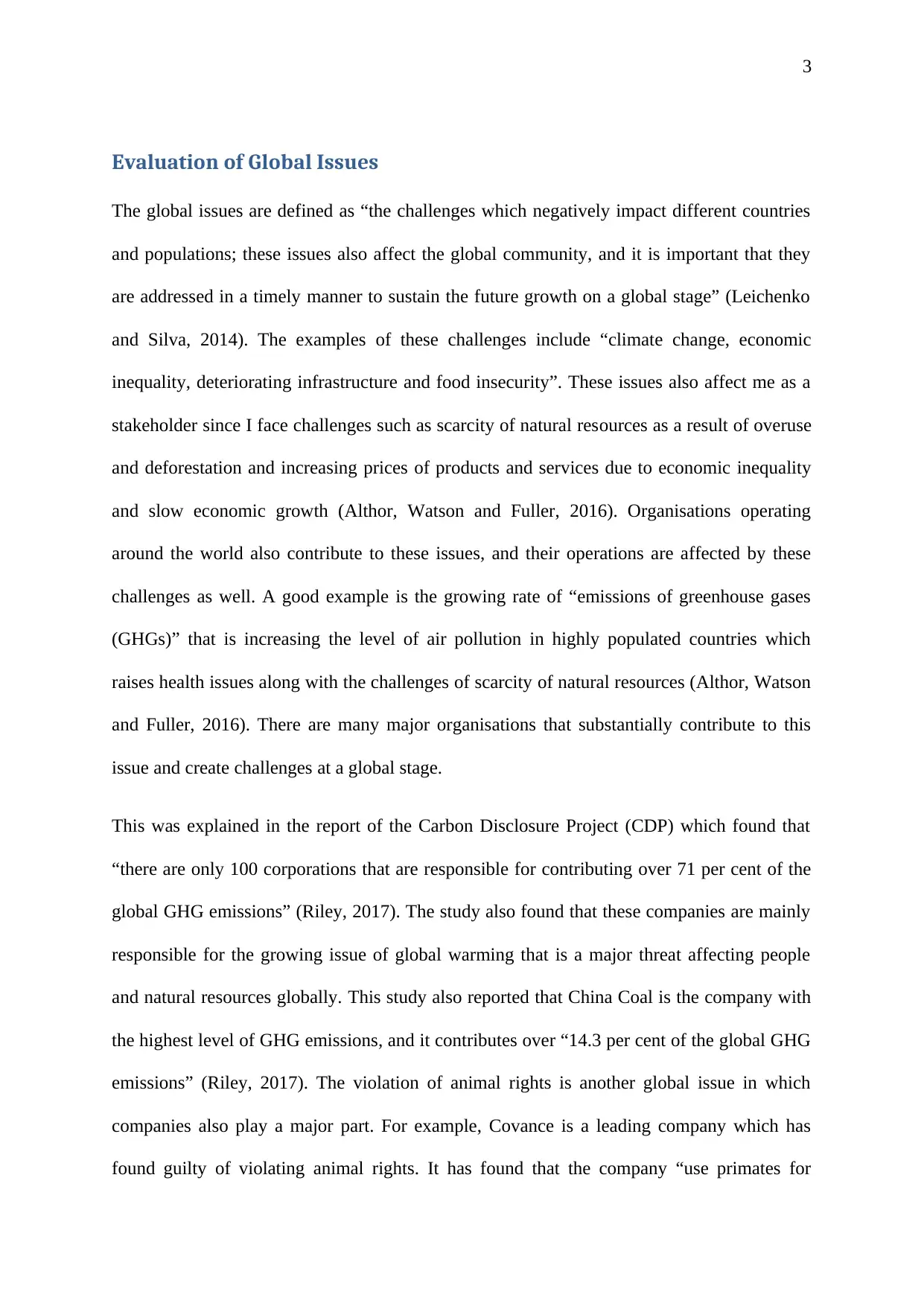
3
Evaluation of Global Issues
The global issues are defined as “the challenges which negatively impact different countries
and populations; these issues also affect the global community, and it is important that they
are addressed in a timely manner to sustain the future growth on a global stage” (Leichenko
and Silva, 2014). The examples of these challenges include “climate change, economic
inequality, deteriorating infrastructure and food insecurity”. These issues also affect me as a
stakeholder since I face challenges such as scarcity of natural resources as a result of overuse
and deforestation and increasing prices of products and services due to economic inequality
and slow economic growth (Althor, Watson and Fuller, 2016). Organisations operating
around the world also contribute to these issues, and their operations are affected by these
challenges as well. A good example is the growing rate of “emissions of greenhouse gases
(GHGs)” that is increasing the level of air pollution in highly populated countries which
raises health issues along with the challenges of scarcity of natural resources (Althor, Watson
and Fuller, 2016). There are many major organisations that substantially contribute to this
issue and create challenges at a global stage.
This was explained in the report of the Carbon Disclosure Project (CDP) which found that
“there are only 100 corporations that are responsible for contributing over 71 per cent of the
global GHG emissions” (Riley, 2017). The study also found that these companies are mainly
responsible for the growing issue of global warming that is a major threat affecting people
and natural resources globally. This study also reported that China Coal is the company with
the highest level of GHG emissions, and it contributes over “14.3 per cent of the global GHG
emissions” (Riley, 2017). The violation of animal rights is another global issue in which
companies also play a major part. For example, Covance is a leading company which has
found guilty of violating animal rights. It has found that the company “use primates for
Evaluation of Global Issues
The global issues are defined as “the challenges which negatively impact different countries
and populations; these issues also affect the global community, and it is important that they
are addressed in a timely manner to sustain the future growth on a global stage” (Leichenko
and Silva, 2014). The examples of these challenges include “climate change, economic
inequality, deteriorating infrastructure and food insecurity”. These issues also affect me as a
stakeholder since I face challenges such as scarcity of natural resources as a result of overuse
and deforestation and increasing prices of products and services due to economic inequality
and slow economic growth (Althor, Watson and Fuller, 2016). Organisations operating
around the world also contribute to these issues, and their operations are affected by these
challenges as well. A good example is the growing rate of “emissions of greenhouse gases
(GHGs)” that is increasing the level of air pollution in highly populated countries which
raises health issues along with the challenges of scarcity of natural resources (Althor, Watson
and Fuller, 2016). There are many major organisations that substantially contribute to this
issue and create challenges at a global stage.
This was explained in the report of the Carbon Disclosure Project (CDP) which found that
“there are only 100 corporations that are responsible for contributing over 71 per cent of the
global GHG emissions” (Riley, 2017). The study also found that these companies are mainly
responsible for the growing issue of global warming that is a major threat affecting people
and natural resources globally. This study also reported that China Coal is the company with
the highest level of GHG emissions, and it contributes over “14.3 per cent of the global GHG
emissions” (Riley, 2017). The violation of animal rights is another global issue in which
companies also play a major part. For example, Covance is a leading company which has
found guilty of violating animal rights. It has found that the company “use primates for
Paraphrase This Document
Need a fresh take? Get an instant paraphrase of this document with our AI Paraphraser
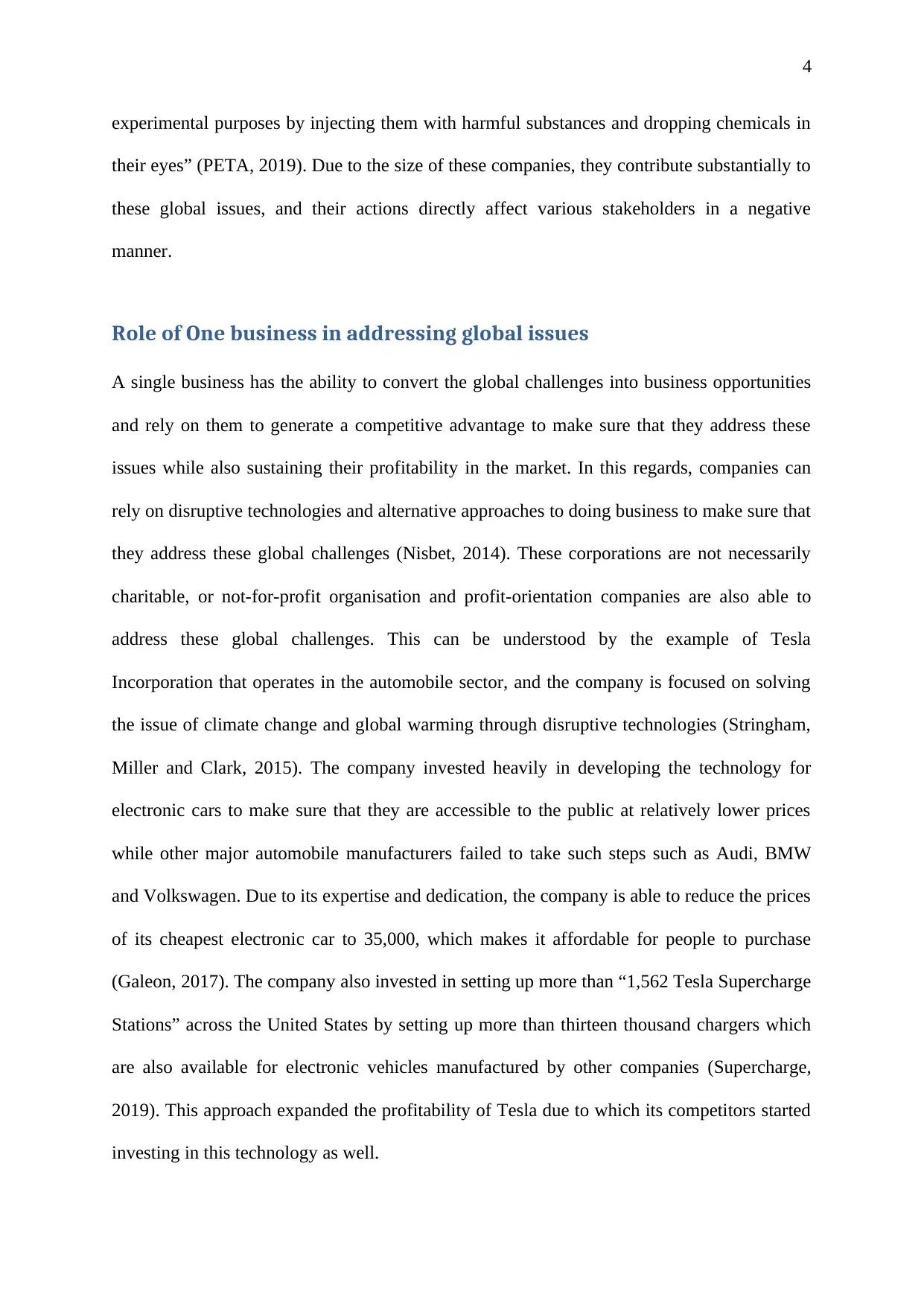
4
experimental purposes by injecting them with harmful substances and dropping chemicals in
their eyes” (PETA, 2019). Due to the size of these companies, they contribute substantially to
these global issues, and their actions directly affect various stakeholders in a negative
manner.
Role of One business in addressing global issues
A single business has the ability to convert the global challenges into business opportunities
and rely on them to generate a competitive advantage to make sure that they address these
issues while also sustaining their profitability in the market. In this regards, companies can
rely on disruptive technologies and alternative approaches to doing business to make sure that
they address these global challenges (Nisbet, 2014). These corporations are not necessarily
charitable, or not-for-profit organisation and profit-orientation companies are also able to
address these global challenges. This can be understood by the example of Tesla
Incorporation that operates in the automobile sector, and the company is focused on solving
the issue of climate change and global warming through disruptive technologies (Stringham,
Miller and Clark, 2015). The company invested heavily in developing the technology for
electronic cars to make sure that they are accessible to the public at relatively lower prices
while other major automobile manufacturers failed to take such steps such as Audi, BMW
and Volkswagen. Due to its expertise and dedication, the company is able to reduce the prices
of its cheapest electronic car to 35,000, which makes it affordable for people to purchase
(Galeon, 2017). The company also invested in setting up more than “1,562 Tesla Supercharge
Stations” across the United States by setting up more than thirteen thousand chargers which
are also available for electronic vehicles manufactured by other companies (Supercharge,
2019). This approach expanded the profitability of Tesla due to which its competitors started
investing in this technology as well.
experimental purposes by injecting them with harmful substances and dropping chemicals in
their eyes” (PETA, 2019). Due to the size of these companies, they contribute substantially to
these global issues, and their actions directly affect various stakeholders in a negative
manner.
Role of One business in addressing global issues
A single business has the ability to convert the global challenges into business opportunities
and rely on them to generate a competitive advantage to make sure that they address these
issues while also sustaining their profitability in the market. In this regards, companies can
rely on disruptive technologies and alternative approaches to doing business to make sure that
they address these global challenges (Nisbet, 2014). These corporations are not necessarily
charitable, or not-for-profit organisation and profit-orientation companies are also able to
address these global challenges. This can be understood by the example of Tesla
Incorporation that operates in the automobile sector, and the company is focused on solving
the issue of climate change and global warming through disruptive technologies (Stringham,
Miller and Clark, 2015). The company invested heavily in developing the technology for
electronic cars to make sure that they are accessible to the public at relatively lower prices
while other major automobile manufacturers failed to take such steps such as Audi, BMW
and Volkswagen. Due to its expertise and dedication, the company is able to reduce the prices
of its cheapest electronic car to 35,000, which makes it affordable for people to purchase
(Galeon, 2017). The company also invested in setting up more than “1,562 Tesla Supercharge
Stations” across the United States by setting up more than thirteen thousand chargers which
are also available for electronic vehicles manufactured by other companies (Supercharge,
2019). This approach expanded the profitability of Tesla due to which its competitors started
investing in this technology as well.
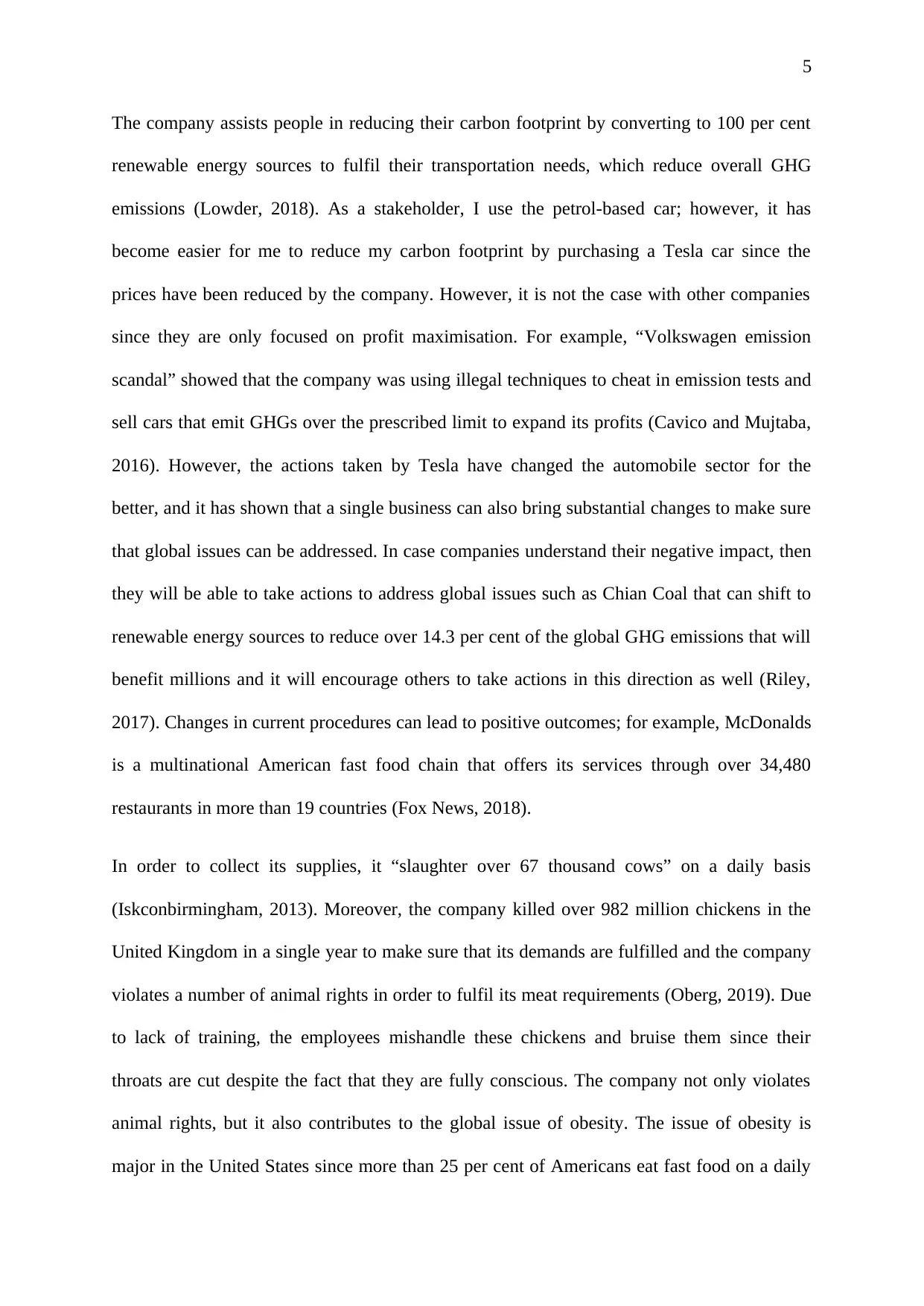
5
The company assists people in reducing their carbon footprint by converting to 100 per cent
renewable energy sources to fulfil their transportation needs, which reduce overall GHG
emissions (Lowder, 2018). As a stakeholder, I use the petrol-based car; however, it has
become easier for me to reduce my carbon footprint by purchasing a Tesla car since the
prices have been reduced by the company. However, it is not the case with other companies
since they are only focused on profit maximisation. For example, “Volkswagen emission
scandal” showed that the company was using illegal techniques to cheat in emission tests and
sell cars that emit GHGs over the prescribed limit to expand its profits (Cavico and Mujtaba,
2016). However, the actions taken by Tesla have changed the automobile sector for the
better, and it has shown that a single business can also bring substantial changes to make sure
that global issues can be addressed. In case companies understand their negative impact, then
they will be able to take actions to address global issues such as Chian Coal that can shift to
renewable energy sources to reduce over 14.3 per cent of the global GHG emissions that will
benefit millions and it will encourage others to take actions in this direction as well (Riley,
2017). Changes in current procedures can lead to positive outcomes; for example, McDonalds
is a multinational American fast food chain that offers its services through over 34,480
restaurants in more than 19 countries (Fox News, 2018).
In order to collect its supplies, it “slaughter over 67 thousand cows” on a daily basis
(Iskconbirmingham, 2013). Moreover, the company killed over 982 million chickens in the
United Kingdom in a single year to make sure that its demands are fulfilled and the company
violates a number of animal rights in order to fulfil its meat requirements (Oberg, 2019). Due
to lack of training, the employees mishandle these chickens and bruise them since their
throats are cut despite the fact that they are fully conscious. The company not only violates
animal rights, but it also contributes to the global issue of obesity. The issue of obesity is
major in the United States since more than 25 per cent of Americans eat fast food on a daily
The company assists people in reducing their carbon footprint by converting to 100 per cent
renewable energy sources to fulfil their transportation needs, which reduce overall GHG
emissions (Lowder, 2018). As a stakeholder, I use the petrol-based car; however, it has
become easier for me to reduce my carbon footprint by purchasing a Tesla car since the
prices have been reduced by the company. However, it is not the case with other companies
since they are only focused on profit maximisation. For example, “Volkswagen emission
scandal” showed that the company was using illegal techniques to cheat in emission tests and
sell cars that emit GHGs over the prescribed limit to expand its profits (Cavico and Mujtaba,
2016). However, the actions taken by Tesla have changed the automobile sector for the
better, and it has shown that a single business can also bring substantial changes to make sure
that global issues can be addressed. In case companies understand their negative impact, then
they will be able to take actions to address global issues such as Chian Coal that can shift to
renewable energy sources to reduce over 14.3 per cent of the global GHG emissions that will
benefit millions and it will encourage others to take actions in this direction as well (Riley,
2017). Changes in current procedures can lead to positive outcomes; for example, McDonalds
is a multinational American fast food chain that offers its services through over 34,480
restaurants in more than 19 countries (Fox News, 2018).
In order to collect its supplies, it “slaughter over 67 thousand cows” on a daily basis
(Iskconbirmingham, 2013). Moreover, the company killed over 982 million chickens in the
United Kingdom in a single year to make sure that its demands are fulfilled and the company
violates a number of animal rights in order to fulfil its meat requirements (Oberg, 2019). Due
to lack of training, the employees mishandle these chickens and bruise them since their
throats are cut despite the fact that they are fully conscious. The company not only violates
animal rights, but it also contributes to the global issue of obesity. The issue of obesity is
major in the United States since more than 25 per cent of Americans eat fast food on a daily
⊘ This is a preview!⊘
Do you want full access?
Subscribe today to unlock all pages.

Trusted by 1+ million students worldwide
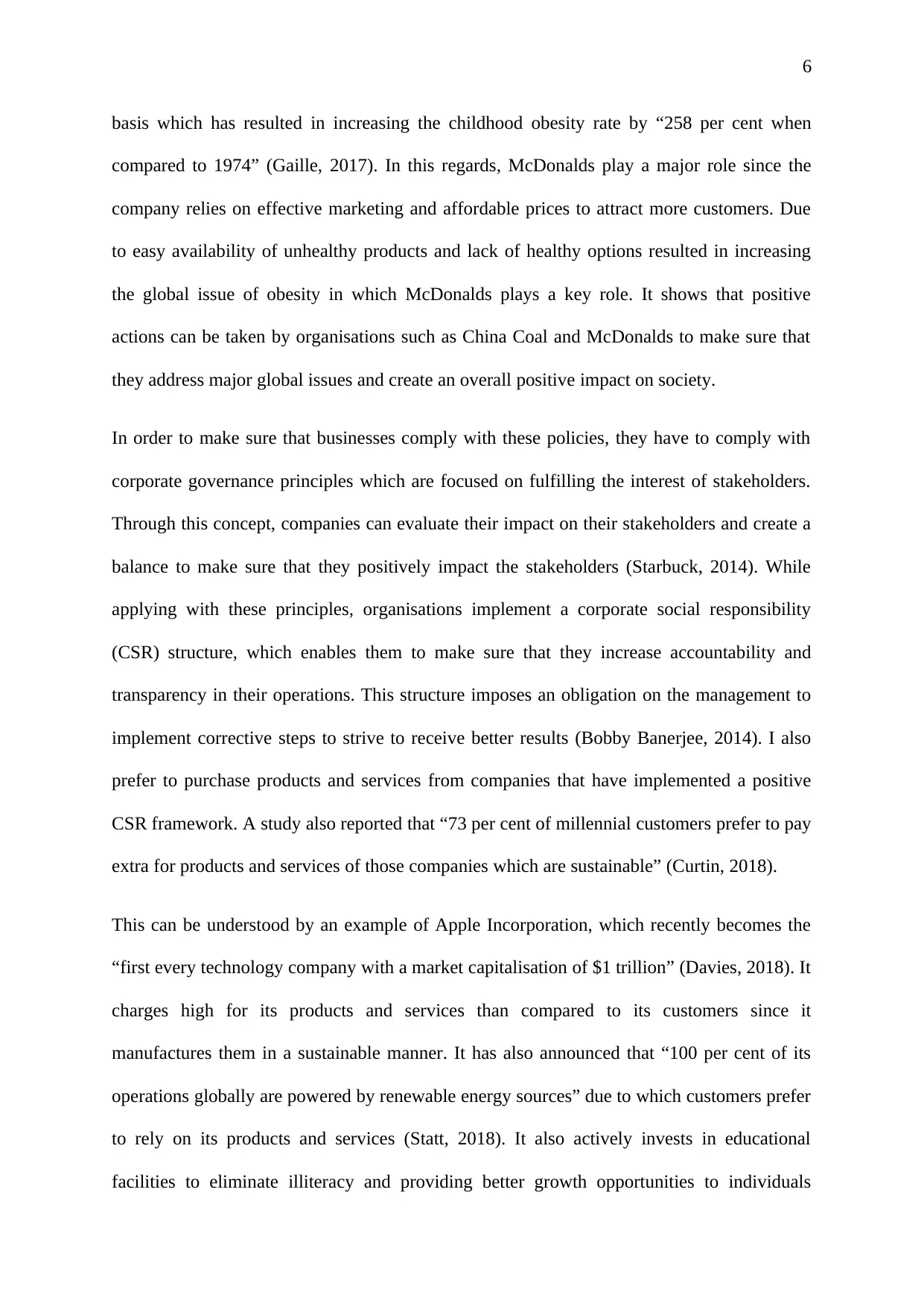
6
basis which has resulted in increasing the childhood obesity rate by “258 per cent when
compared to 1974” (Gaille, 2017). In this regards, McDonalds play a major role since the
company relies on effective marketing and affordable prices to attract more customers. Due
to easy availability of unhealthy products and lack of healthy options resulted in increasing
the global issue of obesity in which McDonalds plays a key role. It shows that positive
actions can be taken by organisations such as China Coal and McDonalds to make sure that
they address major global issues and create an overall positive impact on society.
In order to make sure that businesses comply with these policies, they have to comply with
corporate governance principles which are focused on fulfilling the interest of stakeholders.
Through this concept, companies can evaluate their impact on their stakeholders and create a
balance to make sure that they positively impact the stakeholders (Starbuck, 2014). While
applying with these principles, organisations implement a corporate social responsibility
(CSR) structure, which enables them to make sure that they increase accountability and
transparency in their operations. This structure imposes an obligation on the management to
implement corrective steps to strive to receive better results (Bobby Banerjee, 2014). I also
prefer to purchase products and services from companies that have implemented a positive
CSR framework. A study also reported that “73 per cent of millennial customers prefer to pay
extra for products and services of those companies which are sustainable” (Curtin, 2018).
This can be understood by an example of Apple Incorporation, which recently becomes the
“first every technology company with a market capitalisation of $1 trillion” (Davies, 2018). It
charges high for its products and services than compared to its customers since it
manufactures them in a sustainable manner. It has also announced that “100 per cent of its
operations globally are powered by renewable energy sources” due to which customers prefer
to rely on its products and services (Statt, 2018). It also actively invests in educational
facilities to eliminate illiteracy and providing better growth opportunities to individuals
basis which has resulted in increasing the childhood obesity rate by “258 per cent when
compared to 1974” (Gaille, 2017). In this regards, McDonalds play a major role since the
company relies on effective marketing and affordable prices to attract more customers. Due
to easy availability of unhealthy products and lack of healthy options resulted in increasing
the global issue of obesity in which McDonalds plays a key role. It shows that positive
actions can be taken by organisations such as China Coal and McDonalds to make sure that
they address major global issues and create an overall positive impact on society.
In order to make sure that businesses comply with these policies, they have to comply with
corporate governance principles which are focused on fulfilling the interest of stakeholders.
Through this concept, companies can evaluate their impact on their stakeholders and create a
balance to make sure that they positively impact the stakeholders (Starbuck, 2014). While
applying with these principles, organisations implement a corporate social responsibility
(CSR) structure, which enables them to make sure that they increase accountability and
transparency in their operations. This structure imposes an obligation on the management to
implement corrective steps to strive to receive better results (Bobby Banerjee, 2014). I also
prefer to purchase products and services from companies that have implemented a positive
CSR framework. A study also reported that “73 per cent of millennial customers prefer to pay
extra for products and services of those companies which are sustainable” (Curtin, 2018).
This can be understood by an example of Apple Incorporation, which recently becomes the
“first every technology company with a market capitalisation of $1 trillion” (Davies, 2018). It
charges high for its products and services than compared to its customers since it
manufactures them in a sustainable manner. It has also announced that “100 per cent of its
operations globally are powered by renewable energy sources” due to which customers prefer
to rely on its products and services (Statt, 2018). It also actively invests in educational
facilities to eliminate illiteracy and providing better growth opportunities to individuals
Paraphrase This Document
Need a fresh take? Get an instant paraphrase of this document with our AI Paraphraser
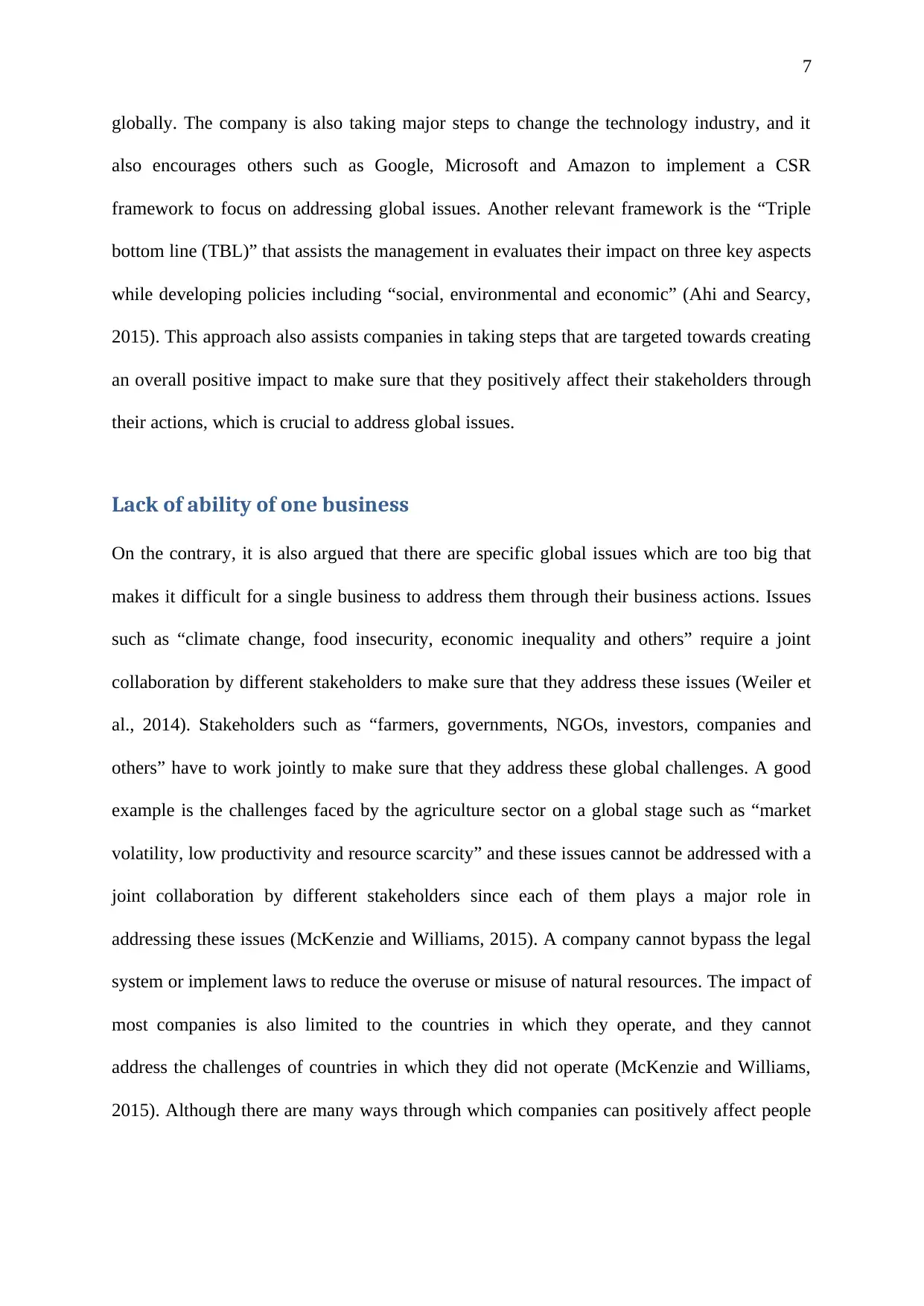
7
globally. The company is also taking major steps to change the technology industry, and it
also encourages others such as Google, Microsoft and Amazon to implement a CSR
framework to focus on addressing global issues. Another relevant framework is the “Triple
bottom line (TBL)” that assists the management in evaluates their impact on three key aspects
while developing policies including “social, environmental and economic” (Ahi and Searcy,
2015). This approach also assists companies in taking steps that are targeted towards creating
an overall positive impact to make sure that they positively affect their stakeholders through
their actions, which is crucial to address global issues.
Lack of ability of one business
On the contrary, it is also argued that there are specific global issues which are too big that
makes it difficult for a single business to address them through their business actions. Issues
such as “climate change, food insecurity, economic inequality and others” require a joint
collaboration by different stakeholders to make sure that they address these issues (Weiler et
al., 2014). Stakeholders such as “farmers, governments, NGOs, investors, companies and
others” have to work jointly to make sure that they address these global challenges. A good
example is the challenges faced by the agriculture sector on a global stage such as “market
volatility, low productivity and resource scarcity” and these issues cannot be addressed with a
joint collaboration by different stakeholders since each of them plays a major role in
addressing these issues (McKenzie and Williams, 2015). A company cannot bypass the legal
system or implement laws to reduce the overuse or misuse of natural resources. The impact of
most companies is also limited to the countries in which they operate, and they cannot
address the challenges of countries in which they did not operate (McKenzie and Williams,
2015). Although there are many ways through which companies can positively affect people
globally. The company is also taking major steps to change the technology industry, and it
also encourages others such as Google, Microsoft and Amazon to implement a CSR
framework to focus on addressing global issues. Another relevant framework is the “Triple
bottom line (TBL)” that assists the management in evaluates their impact on three key aspects
while developing policies including “social, environmental and economic” (Ahi and Searcy,
2015). This approach also assists companies in taking steps that are targeted towards creating
an overall positive impact to make sure that they positively affect their stakeholders through
their actions, which is crucial to address global issues.
Lack of ability of one business
On the contrary, it is also argued that there are specific global issues which are too big that
makes it difficult for a single business to address them through their business actions. Issues
such as “climate change, food insecurity, economic inequality and others” require a joint
collaboration by different stakeholders to make sure that they address these issues (Weiler et
al., 2014). Stakeholders such as “farmers, governments, NGOs, investors, companies and
others” have to work jointly to make sure that they address these global challenges. A good
example is the challenges faced by the agriculture sector on a global stage such as “market
volatility, low productivity and resource scarcity” and these issues cannot be addressed with a
joint collaboration by different stakeholders since each of them plays a major role in
addressing these issues (McKenzie and Williams, 2015). A company cannot bypass the legal
system or implement laws to reduce the overuse or misuse of natural resources. The impact of
most companies is also limited to the countries in which they operate, and they cannot
address the challenges of countries in which they did not operate (McKenzie and Williams,
2015). Although there are many ways through which companies can positively affect people
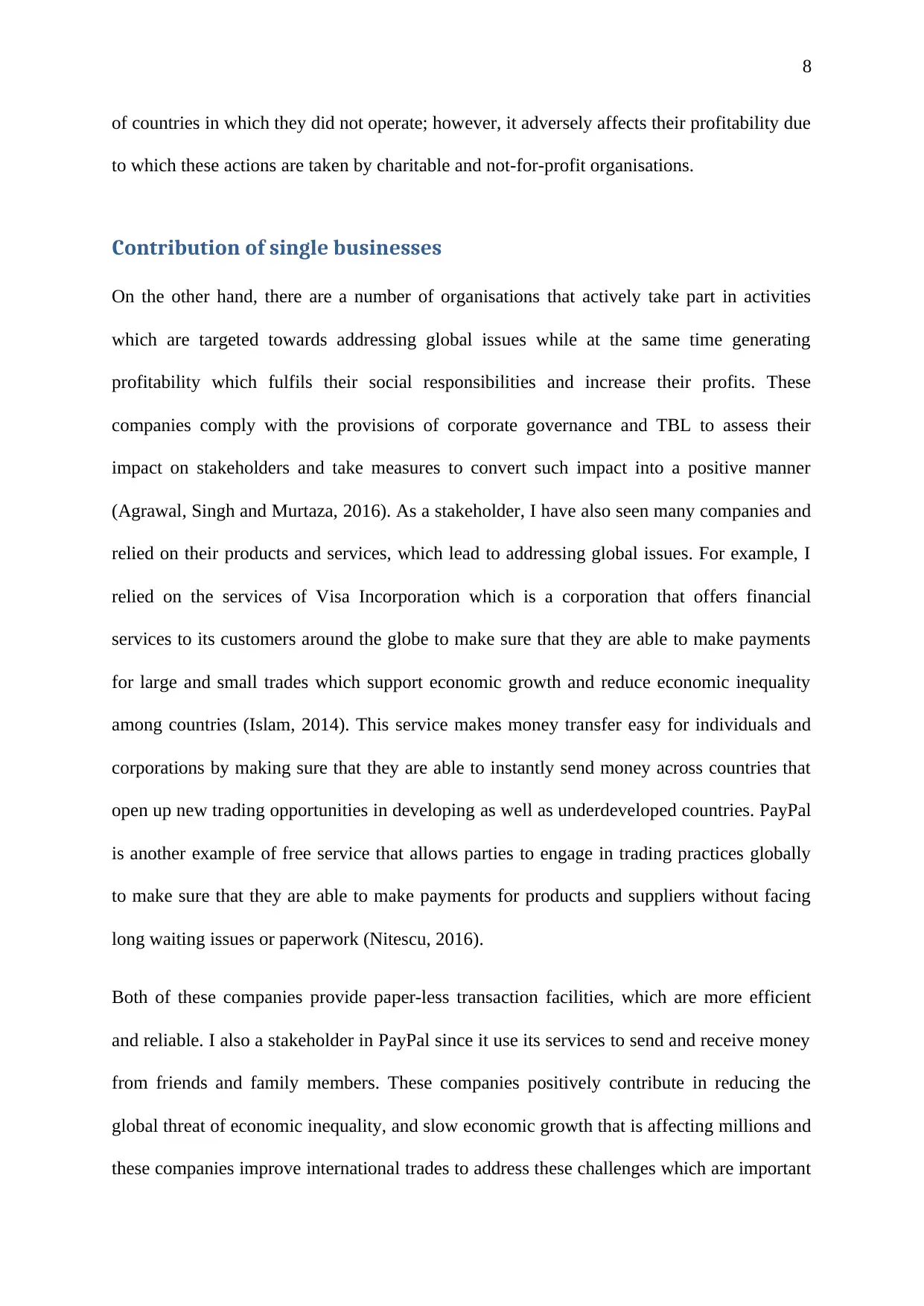
8
of countries in which they did not operate; however, it adversely affects their profitability due
to which these actions are taken by charitable and not-for-profit organisations.
Contribution of single businesses
On the other hand, there are a number of organisations that actively take part in activities
which are targeted towards addressing global issues while at the same time generating
profitability which fulfils their social responsibilities and increase their profits. These
companies comply with the provisions of corporate governance and TBL to assess their
impact on stakeholders and take measures to convert such impact into a positive manner
(Agrawal, Singh and Murtaza, 2016). As a stakeholder, I have also seen many companies and
relied on their products and services, which lead to addressing global issues. For example, I
relied on the services of Visa Incorporation which is a corporation that offers financial
services to its customers around the globe to make sure that they are able to make payments
for large and small trades which support economic growth and reduce economic inequality
among countries (Islam, 2014). This service makes money transfer easy for individuals and
corporations by making sure that they are able to instantly send money across countries that
open up new trading opportunities in developing as well as underdeveloped countries. PayPal
is another example of free service that allows parties to engage in trading practices globally
to make sure that they are able to make payments for products and suppliers without facing
long waiting issues or paperwork (Nitescu, 2016).
Both of these companies provide paper-less transaction facilities, which are more efficient
and reliable. I also a stakeholder in PayPal since it use its services to send and receive money
from friends and family members. These companies positively contribute in reducing the
global threat of economic inequality, and slow economic growth that is affecting millions and
these companies improve international trades to address these challenges which are important
of countries in which they did not operate; however, it adversely affects their profitability due
to which these actions are taken by charitable and not-for-profit organisations.
Contribution of single businesses
On the other hand, there are a number of organisations that actively take part in activities
which are targeted towards addressing global issues while at the same time generating
profitability which fulfils their social responsibilities and increase their profits. These
companies comply with the provisions of corporate governance and TBL to assess their
impact on stakeholders and take measures to convert such impact into a positive manner
(Agrawal, Singh and Murtaza, 2016). As a stakeholder, I have also seen many companies and
relied on their products and services, which lead to addressing global issues. For example, I
relied on the services of Visa Incorporation which is a corporation that offers financial
services to its customers around the globe to make sure that they are able to make payments
for large and small trades which support economic growth and reduce economic inequality
among countries (Islam, 2014). This service makes money transfer easy for individuals and
corporations by making sure that they are able to instantly send money across countries that
open up new trading opportunities in developing as well as underdeveloped countries. PayPal
is another example of free service that allows parties to engage in trading practices globally
to make sure that they are able to make payments for products and suppliers without facing
long waiting issues or paperwork (Nitescu, 2016).
Both of these companies provide paper-less transaction facilities, which are more efficient
and reliable. I also a stakeholder in PayPal since it use its services to send and receive money
from friends and family members. These companies positively contribute in reducing the
global threat of economic inequality, and slow economic growth that is affecting millions and
these companies improve international trades to address these challenges which are important
⊘ This is a preview!⊘
Do you want full access?
Subscribe today to unlock all pages.

Trusted by 1+ million students worldwide
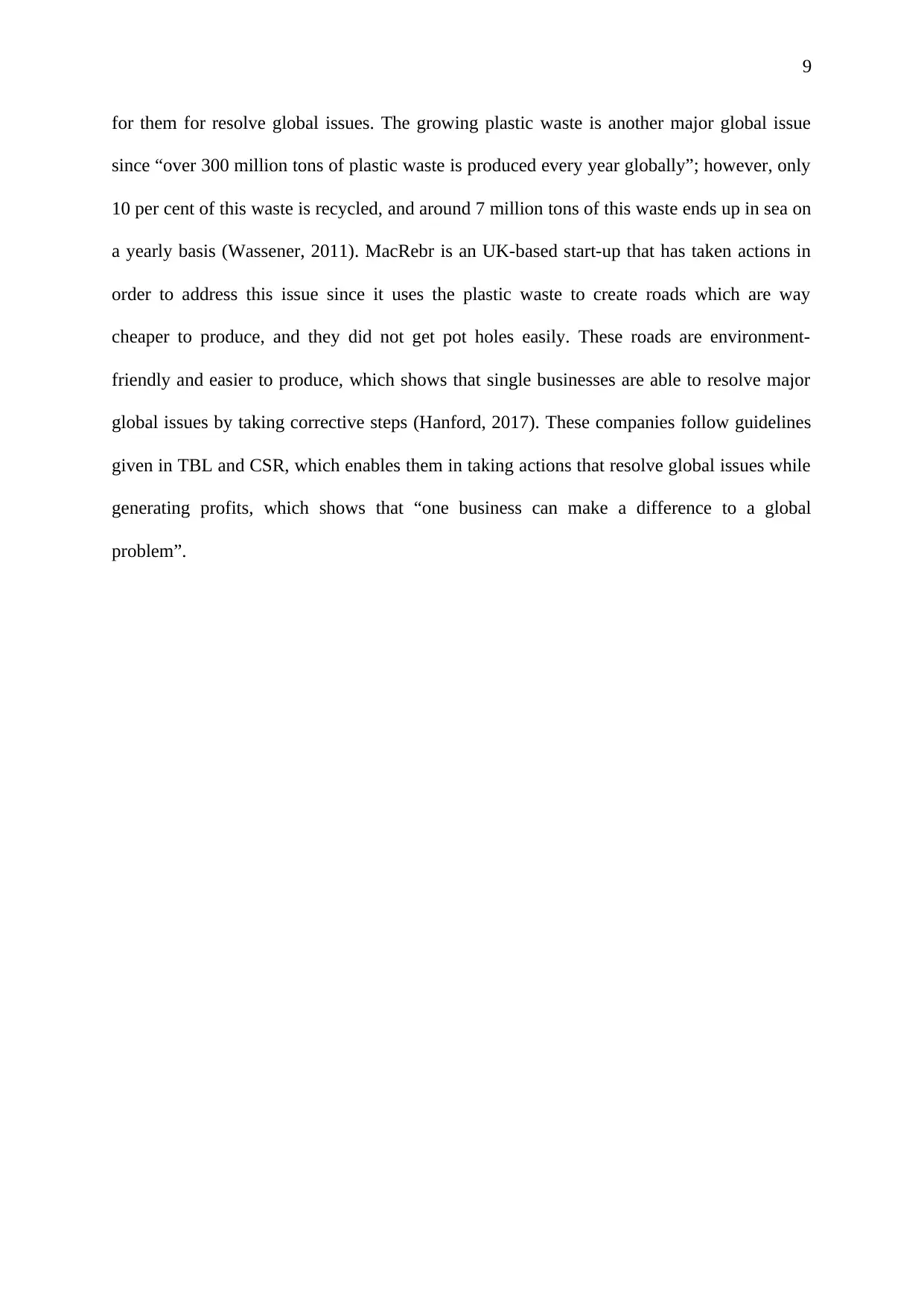
9
for them for resolve global issues. The growing plastic waste is another major global issue
since “over 300 million tons of plastic waste is produced every year globally”; however, only
10 per cent of this waste is recycled, and around 7 million tons of this waste ends up in sea on
a yearly basis (Wassener, 2011). MacRebr is an UK-based start-up that has taken actions in
order to address this issue since it uses the plastic waste to create roads which are way
cheaper to produce, and they did not get pot holes easily. These roads are environment-
friendly and easier to produce, which shows that single businesses are able to resolve major
global issues by taking corrective steps (Hanford, 2017). These companies follow guidelines
given in TBL and CSR, which enables them in taking actions that resolve global issues while
generating profits, which shows that “one business can make a difference to a global
problem”.
for them for resolve global issues. The growing plastic waste is another major global issue
since “over 300 million tons of plastic waste is produced every year globally”; however, only
10 per cent of this waste is recycled, and around 7 million tons of this waste ends up in sea on
a yearly basis (Wassener, 2011). MacRebr is an UK-based start-up that has taken actions in
order to address this issue since it uses the plastic waste to create roads which are way
cheaper to produce, and they did not get pot holes easily. These roads are environment-
friendly and easier to produce, which shows that single businesses are able to resolve major
global issues by taking corrective steps (Hanford, 2017). These companies follow guidelines
given in TBL and CSR, which enables them in taking actions that resolve global issues while
generating profits, which shows that “one business can make a difference to a global
problem”.
Paraphrase This Document
Need a fresh take? Get an instant paraphrase of this document with our AI Paraphraser
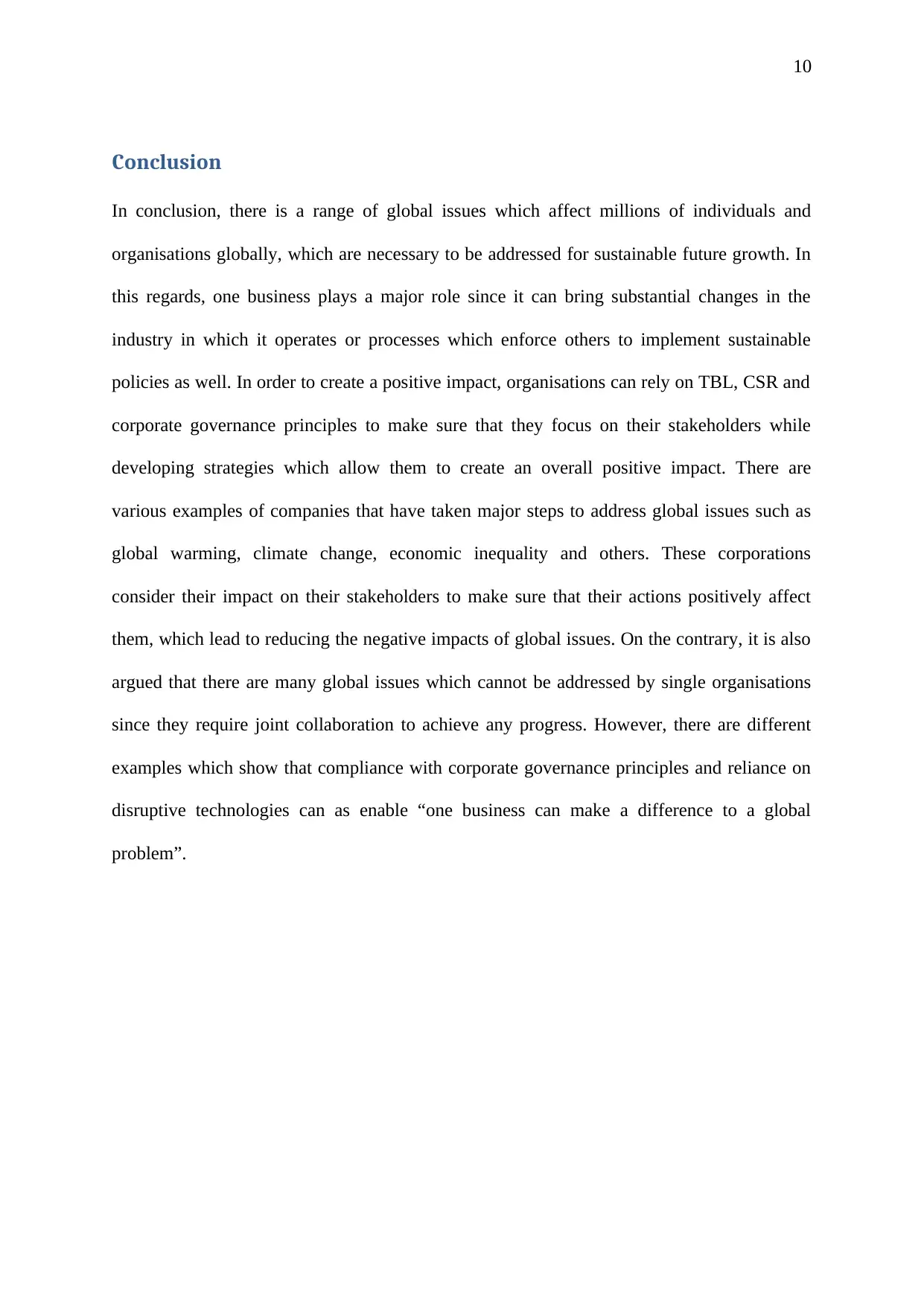
10
Conclusion
In conclusion, there is a range of global issues which affect millions of individuals and
organisations globally, which are necessary to be addressed for sustainable future growth. In
this regards, one business plays a major role since it can bring substantial changes in the
industry in which it operates or processes which enforce others to implement sustainable
policies as well. In order to create a positive impact, organisations can rely on TBL, CSR and
corporate governance principles to make sure that they focus on their stakeholders while
developing strategies which allow them to create an overall positive impact. There are
various examples of companies that have taken major steps to address global issues such as
global warming, climate change, economic inequality and others. These corporations
consider their impact on their stakeholders to make sure that their actions positively affect
them, which lead to reducing the negative impacts of global issues. On the contrary, it is also
argued that there are many global issues which cannot be addressed by single organisations
since they require joint collaboration to achieve any progress. However, there are different
examples which show that compliance with corporate governance principles and reliance on
disruptive technologies can as enable “one business can make a difference to a global
problem”.
Conclusion
In conclusion, there is a range of global issues which affect millions of individuals and
organisations globally, which are necessary to be addressed for sustainable future growth. In
this regards, one business plays a major role since it can bring substantial changes in the
industry in which it operates or processes which enforce others to implement sustainable
policies as well. In order to create a positive impact, organisations can rely on TBL, CSR and
corporate governance principles to make sure that they focus on their stakeholders while
developing strategies which allow them to create an overall positive impact. There are
various examples of companies that have taken major steps to address global issues such as
global warming, climate change, economic inequality and others. These corporations
consider their impact on their stakeholders to make sure that their actions positively affect
them, which lead to reducing the negative impacts of global issues. On the contrary, it is also
argued that there are many global issues which cannot be addressed by single organisations
since they require joint collaboration to achieve any progress. However, there are different
examples which show that compliance with corporate governance principles and reliance on
disruptive technologies can as enable “one business can make a difference to a global
problem”.
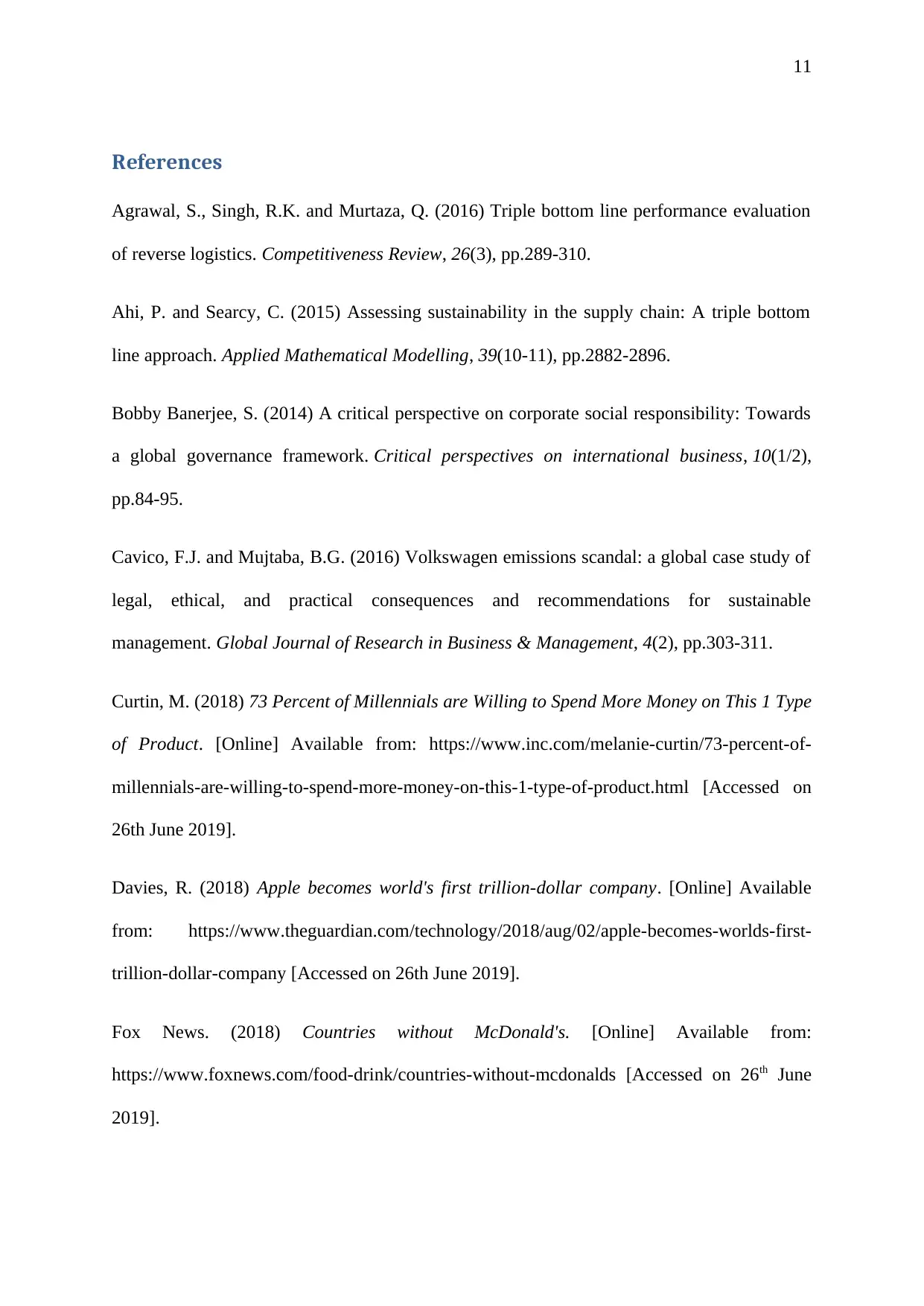
11
References
Agrawal, S., Singh, R.K. and Murtaza, Q. (2016) Triple bottom line performance evaluation
of reverse logistics. Competitiveness Review, 26(3), pp.289-310.
Ahi, P. and Searcy, C. (2015) Assessing sustainability in the supply chain: A triple bottom
line approach. Applied Mathematical Modelling, 39(10-11), pp.2882-2896.
Bobby Banerjee, S. (2014) A critical perspective on corporate social responsibility: Towards
a global governance framework. Critical perspectives on international business, 10(1/2),
pp.84-95.
Cavico, F.J. and Mujtaba, B.G. (2016) Volkswagen emissions scandal: a global case study of
legal, ethical, and practical consequences and recommendations for sustainable
management. Global Journal of Research in Business & Management, 4(2), pp.303-311.
Curtin, M. (2018) 73 Percent of Millennials are Willing to Spend More Money on This 1 Type
of Product. [Online] Available from: https://www.inc.com/melanie-curtin/73-percent-of-
millennials-are-willing-to-spend-more-money-on-this-1-type-of-product.html [Accessed on
26th June 2019].
Davies, R. (2018) Apple becomes world's first trillion-dollar company. [Online] Available
from: https://www.theguardian.com/technology/2018/aug/02/apple-becomes-worlds-first-
trillion-dollar-company [Accessed on 26th June 2019].
Fox News. (2018) Countries without McDonald's. [Online] Available from:
https://www.foxnews.com/food-drink/countries-without-mcdonalds [Accessed on 26th June
2019].
References
Agrawal, S., Singh, R.K. and Murtaza, Q. (2016) Triple bottom line performance evaluation
of reverse logistics. Competitiveness Review, 26(3), pp.289-310.
Ahi, P. and Searcy, C. (2015) Assessing sustainability in the supply chain: A triple bottom
line approach. Applied Mathematical Modelling, 39(10-11), pp.2882-2896.
Bobby Banerjee, S. (2014) A critical perspective on corporate social responsibility: Towards
a global governance framework. Critical perspectives on international business, 10(1/2),
pp.84-95.
Cavico, F.J. and Mujtaba, B.G. (2016) Volkswagen emissions scandal: a global case study of
legal, ethical, and practical consequences and recommendations for sustainable
management. Global Journal of Research in Business & Management, 4(2), pp.303-311.
Curtin, M. (2018) 73 Percent of Millennials are Willing to Spend More Money on This 1 Type
of Product. [Online] Available from: https://www.inc.com/melanie-curtin/73-percent-of-
millennials-are-willing-to-spend-more-money-on-this-1-type-of-product.html [Accessed on
26th June 2019].
Davies, R. (2018) Apple becomes world's first trillion-dollar company. [Online] Available
from: https://www.theguardian.com/technology/2018/aug/02/apple-becomes-worlds-first-
trillion-dollar-company [Accessed on 26th June 2019].
Fox News. (2018) Countries without McDonald's. [Online] Available from:
https://www.foxnews.com/food-drink/countries-without-mcdonalds [Accessed on 26th June
2019].
⊘ This is a preview!⊘
Do you want full access?
Subscribe today to unlock all pages.

Trusted by 1+ million students worldwide
1 out of 15
Related Documents
Your All-in-One AI-Powered Toolkit for Academic Success.
+13062052269
info@desklib.com
Available 24*7 on WhatsApp / Email
![[object Object]](/_next/static/media/star-bottom.7253800d.svg)
Unlock your academic potential
Copyright © 2020–2026 A2Z Services. All Rights Reserved. Developed and managed by ZUCOL.




